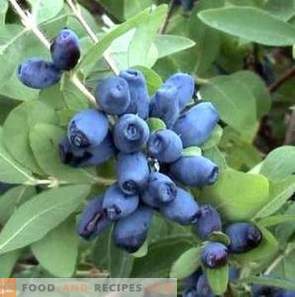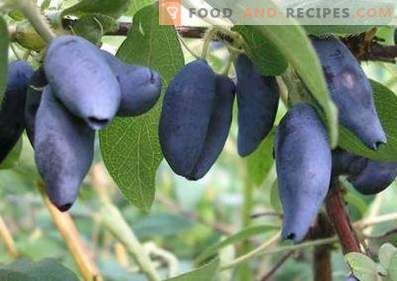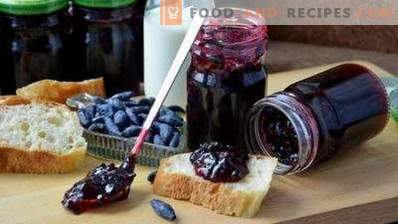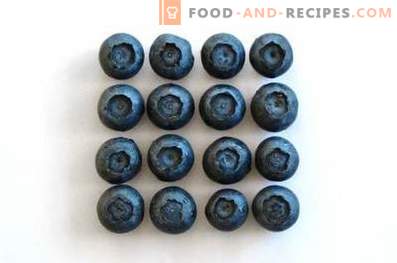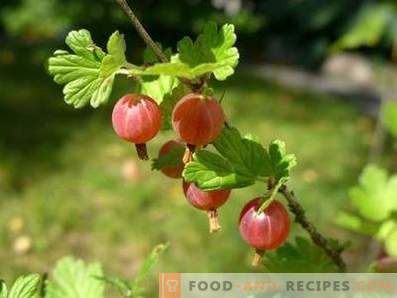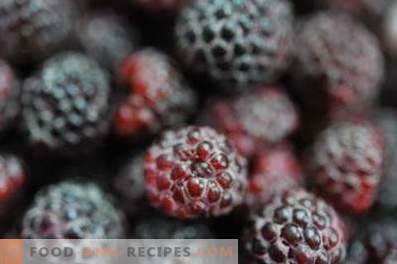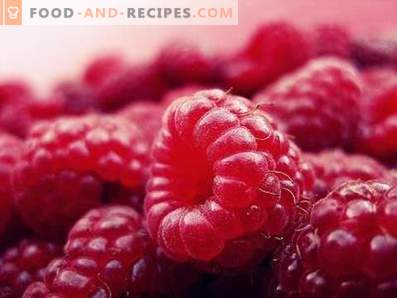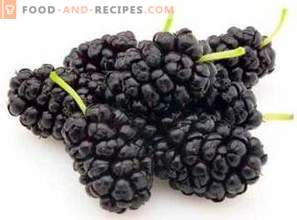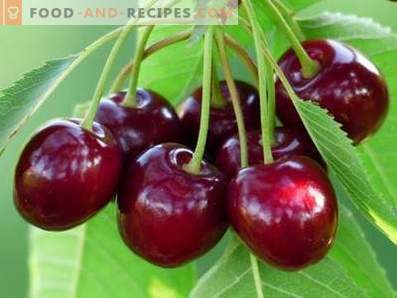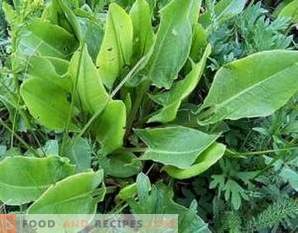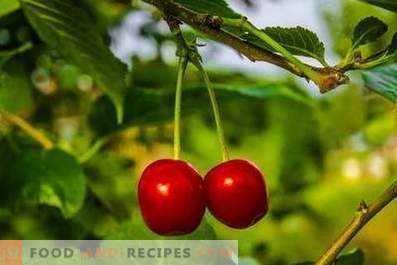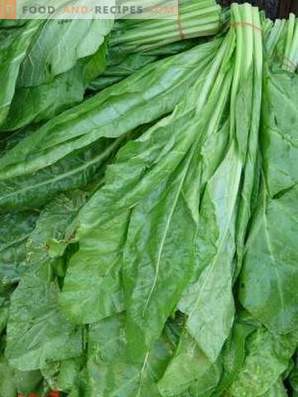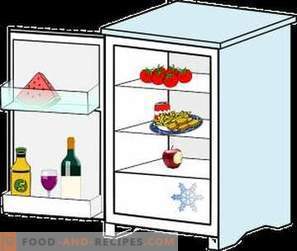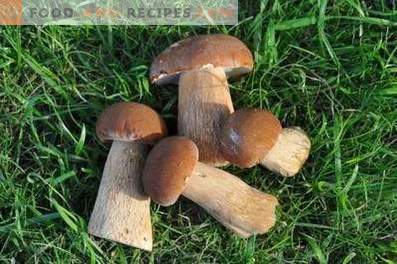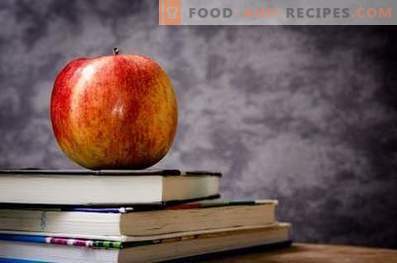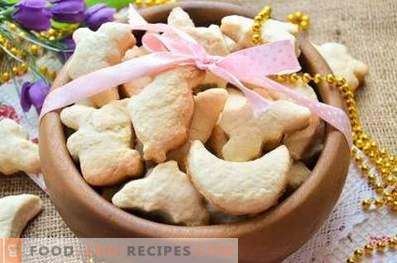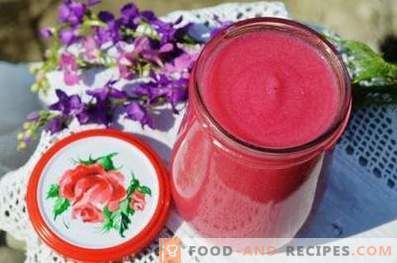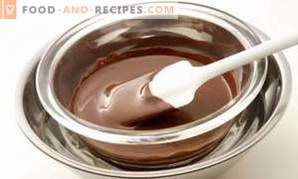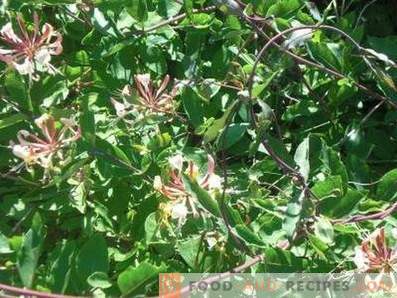
Honeysuckle is a genus of shrubs belonging to the honeysuckle family. Representatives of this genus-group grow in forests, scrub thickets and on riverine meadows of the temperate zone of the Northern Hemisphere. Within the genus allocate more than 190 species of honeysuckle. However, only a few of them give edible fruits.
In the CIS, blue honeysuckle, fruiting with edible bitter-sour berries, is widespread. A shrub with a branching trunk covered with bursting brown bark reaches 250 cm in height. The green leaves of the plant, having the shape of an ellipse, grow up to 30 mm in width and up to 60 mm in length. Bush blooms in June with small pale yellow flowers.
At the end of summer, blue honeysuckle produces a harvest of juicy dark blue berries of elongated elliptical shape. The fruits of the plant are eaten fresh and frozen, dried, used for making jam, alcoholic and non-alcoholic beverages, sweets. Berries, leaves and young shoots of honeysuckle are used in alternative medicine to treat a wide range of pathologies.
Nutritional value of honeysuckle and vitamins in its fruits
Nutritional value honeysuckle (per 100 g of berries):
- 7, 011 g of carbohydrates;
- 74, 865 g of water;
- 2, 391 g of organic acids;
- 14, 106 g of ash.
Vitamins in honeysuckle fruits (per 100 g):
- A, retinol equivalent - 49, 804 mcg;
- B1, thiamine - 0, 017 mg;
- B2, riboflavin - 0, 019 mg;
- C, ascorbic acid - 29, 122 mg;
- beta carotene - 0 284 mg.
Honeysuckle calories
In 100 g of frozen or fresh blue honeysuckle fruit contains 31, 466 kcal. Caloric content of 1 berry with an average weight of 1, 5 g is 0, 472 kcal. Energy value of 1 tbsp. spoons of honeysuckle (30 g) - 9, 439 kcal, cup of fruit (200 g) - 62, 932 kcal.
Honeysuckle drinks contain (in portions weighing 100 g):
- juice - 33, 844 kcal;
- syrup - 211, 394 kcal;
- wine - 69, 033 kcal;
- tincture - 184, 662 kcal;
- liquor - 198, 014 kcal.
The calorie content of dried honeysuckle is 242, 313 kcal per 100 g. A 100 g serving of honeysuckle jam contains 277, 012 kcal.
Useful elements in the composition of honeysuckle
Trace elements in 100 g of honeysuckle:
- 89, 105 μg of aluminum;
- 89, 561 µg copper;
- 0, 087 mg of manganese;
- 89, 576 mcg of strontium;
- 0, 912 mcg of iodine;
- 0, 762 mg of iron.
Macroelements per 100 g of honeysuckle fruit:
- 34, 228 mg of phosphorus;
- 18, 717 mg of calcium;
- 21.056 mg of magnesium;
- 9, 901 mg of silicon;
- 33, 912 mg of sodium;
- 69, 677 mg of potassium.
Benefits of Honeysuckle Berries
- The fruits of honeysuckle perfectly quench thirst in the heat.
- In traditional medicine, honeysuckle juice is used as a febrifuge, antitussive and diaphoretic.
- Fresh fruits of the plant have long been considered a tonic, tonic, allowing the body to recover faster after illness, hard work, intense exercise, increased mental stress.
- Systematic inclusion of honeysuckle in the diet guarantees protection against beriberi.
- Anthocyanins and other compounds with which the fruits of the plant are rich, have anti-inflammatory properties, help prevent the development of rheumatoid arthritis, stomatitis and other inflammatory pathologies.
- Honeysuckle is rich in substances that improve the microcirculation of tissue fluids and blood in the retina. People who regularly consume dishes cooked from it, the ability to distinguish objects in the dark increases, age-related vision loss slows down, and the risk of developing inflammatory ophthalmic diseases decreases.
- Antioxidant compounds entering the human body when eating the berries of a plant prevent the appearance of cancerous tumors, slow down the processes causing the aging of cells and tissues.
- Honeysuckle helps to fill the body's need for substances that strengthen the walls of large and small vessels, which reduce the concentration of cholesterol in the blood, and prevent the formation of atherosclerotic plaques, ensuring uninterrupted blood supply to the myocardium. Due to this, the risk of developing a whole spectrum of cardiac diseases is significantly reduced.
- Fruits of the plant are rich in iron and other substances capable of correcting malfunctions of the hematopoietic system. For anemia, it is recommended to eat 2 large handfuls of berries per day.
- Substances present in the honeysuckle juice regulate blood pressure. It is helpful for hypertensive patients to drink half a glass of this drink every day.
- Honeysuckle has been proven to help reduce the duration of migraine attacks. When the first symptoms of pathology manifest, it is necessary to eat 2/3 cup of ripe fruit.
- Honeysuckle juice contains a complex of useful compounds that help to weaken internal bleeding and minimize their negative effects.
- Substances entering the body through the use of honeysuckle, help to cope with insomnia, nervous disorders, increased irritability, the negative effects of stress.
- Dishes prepared from the berries of the plant help to strengthen the immune system, increase the body's resistance to colds, fungal, parasitic, bacterial and viral infections.
- A decoction of ripe honeysuckle fruit is used to rinse your mouth for gingivitis, stomatitis, tonsillitis, pharyngitis or laryngitis. For the preparation of drugs 1, 5 tbsp. spoons of berries 40 minutes in a glass of boiled water.
- Honeysuckle juice has astringent properties. In folk medicine, this drink is used to treat diarrhea, abdominal distention, flatulence.
- Ripe honeysuckle activates the production of digestive juice, prevents the development of disorders in the intestines and stomach, increases appetite.
- People who have the opportunity to eat 1/2 cup of honeysuckle every day are less likely to experience symptoms of dermatological diseases. With depriving, psoriasis, eczema and other skin diseases, it is useful to treat the affected areas with freshly squeezed fruit juice of this plant.
- A complex of substances has been found in the honeysuckle berries that ensure the timely excretion of radionuclides, heavy metal salts, toxic and toxic compounds from the body. The juice obtained from its fruit, minimizes the harm from snake bites, spiders, insects.
- Compounds present in ripe honeysuckle, stimulate mental activity, improve memory, increase the speed of reactions, help long-term focus on solving certain problems.
Use of leaves, bark and shoots of honeysuckle
- In traditional medicine, a decoction of young shoots and leaves of honeysuckle is used as a choleretic or diuretic. A handful of raw materials boil for 25 minutes in a liter of water, filter the liquid and drink it for a day.
- Rinse the hair with a saturated decoction of thyroid leaves and stems after shampooing. Such procedures help to improve the hair structure, boost their growth, prevent dandruff and the development of alopecia. For the preparation of therapeutic rinse a glass of raw material is boiled in boiling water for 20 minutes, cooled and passed through gauze.
- A disinfectant and regenerating agent is prepared from the honeysuckle leaves to treat burns, superficial ulcers and wounds. A glass of vegetable raw materials poured into a liter jar filled with boiling water, insist 2 hours and well filtered. Ready infusion irrigate the sick areas every 40 minutes.
- A weak decoction of thin twigs and leaves of honeysuckle is considered an effective remedy for dropsy. To prepare it, vegetable raw materials (4 tablespoons) are boiled for 40 minutes in a liter of boiling water. The cooled and filtered liquid is drunk at 100 ml per hour.
- Tea made from honeysuckle leaves helps speed recovery from eczema, herpes and other dermatological diseases. To achieve the expected result, it is enough to drink a glass of this drink every 3 hours.
- Saturated broth of honeysuckle bark is an effective remedy for rheumatism. A glass of raw material is boiled in a liter of boiling water for 20 minutes, let the liquid cool slightly and pass it through gauze folded several times. On the basis of a decoction, warm lotions are prepared and applied to sore spots. In addition, the drug is used to prepare 15-minute therapeutic baths.
- Honeysuckle leaves are an effective decongestant. Plant material (2/3 cup) infuse 2, 5 hours per liter of boiling water, cool, filter and drink for a day.
Contraindications and harm to honeysuckle
- Abuse of honeysuckle fruits can cause diarrhea, abdominal pain, muscle spasms.
- In rare cases, the berries of the plant provoke the occurrence of hypersensitivity reactions of the organism. Allergy sufferers should be careful when turning on dishes from them in the menu.
- Young mothers who breast feed newborns and pregnant women are advised not to consume honeysuckle. Enter this product into the diet can only be subject to consultation with your doctor.
